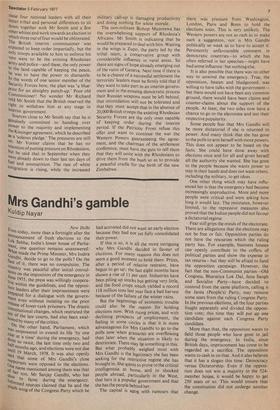Mrs Gandhi's gamble
Kuldip Nayar New Delhi Even today, more than a fortnight after the 1.1nouncement of fresh elections to the L°k Sabha, India's lower house of Parliarilent, one question remains unanswered:
hat made the Prime Minister, Mrs Indira
'-,andhi, decide to go to the polls ? On the face of it, there was no compulsion. The L9uritry was peaceful after initial convuls,t°Rs on the imposition of the emergency in
e 1975, the press was willingly coopera
t!ve within the guidelines, and the oppositiOn leaders after their imprisonment were 13rePared for a dialogue with the governtnent even without insisting on the prior release of lower rank prisoners. The drastic ccInstitutional changes, which restricted the ;4Y of the law courts, had also been swalloWed by many of the critics.
On the other hand, Parliament, which
,was empowered to extend its life 'by one "dear at a time' during the emergency, had L9ne so twice, the last time only two and "air months ago, and elections were not due until 19 March, 1978. It was also openly ssaid that some of Mrs Gandhi's close ouPPorters were opposed to the elections.
name mentioned among them was that her son, Mr Sanjay Gandhi, who has to fame during the emergency. orrned sources claimed that he and the Youth wing of the Congress Party which he had activated did not want an early election because they had not yet fully consolidated their power.
If this is so, it is all the more intriguing why Mrs Gandhi decided in favour of elections. For many reasons this does not seem a good moment to hold them. Prices, after a period of relative restraint, have begun to go up; the last eight months have shown a rise of 11 per cent. Industries have been piling up stocks but getting very little, and the food crops which yielded a record 118 million tons last year face a bad harvest because of the failure of the winter rains.
But the beginnings of economic trouble could also be the reason for holding elections now. With rising prices, and with declining prospects of employment, the feeling in some circles is that it is more advantageous for Mrs Gandhi to go to the polls now when granaries are overflowing than later when the situation is likely to deteriorate. There may he something in this. But what probably weighed most with Mrs Gandhi is the legitimacy she has been seeking for the restrictive regime she has brought in. She wants to prove to the critical intelligentsia at home, and to shocked people abroad, particularly in the West, that hers is a popular government and that she has the people behind her.
The capital is agog with rumours that
there was pressure from Washington, London, Paris and Bonn to hold the elections soon. This is very unlikely. The Western powers are not so rash as to make such a suggestion, nor is Mrs Gandhi politically so weak as to have to accept it. Persistently unfavourable comment in democratic countries—to which she has often referred in her speeches—might have had some influence: but nothingelse.
It is also possible that there was no other way to unwind the emergency. True, the opposition, beaten and bludgeoned, was willing to have talks with the government— but there would not have been any common ground, there would have been claims and counter-claims about the support of the people. At least, the two sides now have a chance to go to the electorate and test their respective popularity.
Some people fear that Mrs Gandhi will be more dictatorial if she is returned to power. And many think that she has gone to the polls to arm herself with more powers. This does not appear to be based on the facts. She could have done away with elections once and for all and given herself all the authority she wanted. She has gone to the people because she wants power to stay in their hands and does not want others, including the military, to get ideas.
One other thing which may have influenced her is that the emergency had become increasingly unproductive. More and more people were critical and were asking how long it would last. The resistance, however limited, to the repressive measures also proved that the Indian people did not favour a dictatorial regime.
Fear still grips the minds of the electorate. There are allegations that the elections may not he free or fair. Opposition parties do not have the resources which the ruling party has. For example, business houses can openly contribute to the coffers of political parties and show the expense in tax returns—but they will be afraid to fund the opposition campaign. However, the fact that the non-Communist parties—Old Congress, Bharatiya Lok Dal, Jana Sangh and Socialist Party—have decided to contend from the same platform, calling it the Janta (People's) Party, may remove some seats from the ruling Congress Party. In the previous elections, all the four parties fought separately and divided the opposition vote; this time they will put up one candidate against each Congress Party candidate.
More than that, the opposition wants to field those people who have gone to jail during the emergency. In India, since British days, imprisonment has come to be regarded as a sacrifice. The opposition wants to cash in on that. And it also believes that it has a slogan this time: Democracy versus Dictatorship. Even if the opposi tion does not win a majority in the 524member house, it would be happy to get 250 seats or so. This would ensure that the constitution did not undergo another change.


































 Previous page
Previous page